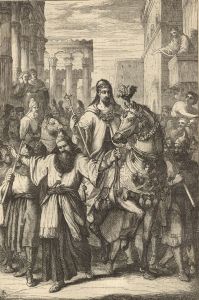




 |
|||||
 |
LECTURES UPON THE BOOK OF ESTHER
Thomas M'Crie![]()
"M'Crie was an outstanding Scottish theologican and historical writer. Such a commentary from a writer of that calibre can only be a blessing to all who get it." - Maurice Roberts![]()
"Best known for his biography on John Knox and ever the consummate church historian, Thomas M'Crie (1772-1835), shows in his lectures on Esther that he is an astute biblical historian as well. These eighteen messages are packed with solid exegetical and practical material. Highly recommended for both the minister and the educated layman, this reliable guide to Esther remains unsurpassed until today."- Joel R. Beeke![]()
CH Spurgeon, in his 'Commenting and Commentaries" ranks M'Crie on Esther with his very highest approval and then quotes as follows: "Dr. Davidson says of Dr. McCrie: 'There is an ancient fable.of a king who was gifted with the power of turning everything he touched into gold; and this eminent divine and historian possessed remarkably the gift of rendering every subject he handled so precious, as at least to discourage any one from attempting to follow in his track. In his Lectures upon the book of Esther, he has certainly left little for any to say who may come after him." ![]()
THOMAS M'CRIE (1772-1835) is best known for his classic LIFE OF JOHN KNOX as well as his two-volume LIFE OF MELVILLE. He was also highly acclaimed for his works on SCOTTISH HISTORY and THE REFORMATION IN SPAIN & ITALY. But above all he was a gifted preacher of the Gospel whose LECTURES UPON THE BOOK OF ESTHER was published in 1838, three years after his death. It is considered by many to be the best commentary ever written upon this book of Holy Scripture.![]()
SG COMMENTARY cmms SCOTSGCB![]()
Nearly 50% Discount![]() SGCB Price: $12.95 (list price $25.00)
SGCB Price: $12.95 (list price $25.00)
NOW AVAILABLE!![]()
Additional Information
• Introduction to New Edition
| Introduction to New Edition |
Thomas M'Crie (1772-1835) is an example of a Christian who, by making spiritual fidelity his primary consideration, was given a fruitfulness that reached far beyond the limited circle of his weekly responsibilities. When M'Crie's Scottish Presbyterian denomination, the General Associate Synod, altered its testimony to lay aside some of its doctrinal commitments, M'Crie was one of five ministers who contended for the maintenance of the sworn pledges made by the church's office bearers. The five ministers, believing that the church had failed to maintain its identity, in 1806 separated themselves and organized the Constitutional Associate Presbytery in order to secure a continuity of testimony. For their action, their former colleagues claimed to depose and excommunicate them.
However, the attention given to these church principles led M'Crie to make the first thorough examination in modern times of the historical setting in which the Scottish Reformed Church had come to hold the convictions now being forsaken by the Associate Synod. The result was M'Crie's extended Life of John Knox (1811), followed by a similar study on Andrew Melville (1819). M'Crie's biography of Knox became instrumental in the resurgence of the evangelical Reformed cause within the dominant Presbyterian denomination in his country, the established Church of Scotland. Similarly, when evangelicals had regained the ascendancy in the Church of Scotland's General Assembly, but found themselves faced with abuses by the civil magistrate, M'Crie's volumes on Melville clarified the principles upon which the evangelicals made a stand in 1843, when a large part of the national church, led by such prominent evangelicals as Thomas Chalmers and William Cunningham, withdrew to form the Free Church of Scotland.
For the remainder of the nineteenth century, the issues defined in the writings of this gentle-spirited scholar were at the forefront of attention in the affairs of Scottish Presbyterianism. His Statement of the Difference (1807) remains one of the finest discussions of the classical Reformed argument that civil rulers have a moral responsibility to exercise their authority on behalf of the true religion. M'Crie's view of church unions, reflected in his Two Discourses on the Unity of the Church (1821), was that they will be accomplished when the Lord raises each of the uniting churches to yet fuller convictions, rather than by a retreat from the confessional attainments reached in an earlier generation. M'Crie saw unity among Christians as the consequence of God reviving his cause and strengthening belief, rather than of a spreading uncertainty about biblical affirmations. M'Crie was the pastor of the same congregation in Edinburgh from his ordination in 1796 until his death, and briefly conducted the Presbytery's divinity hall for the training of ministers from 1816 to 1818.
His Lectures on the Book of Esther, published at Edinburgh and at New York in 1838, are rich in description of the experience of the people of God in their sorrows and in the life of faith. The writer is perceptive in setting forth a penetrating biblical analysis of the motives for human conduct. There are many illuminating observations on the principal characters in the canonical narrative, and the whole exposition successfully captures the marvel of the Lord's care amidst all dangers for those who cast themselves dependently on him.
Rev. R. Sherman Isbell
Fairfax, VA
